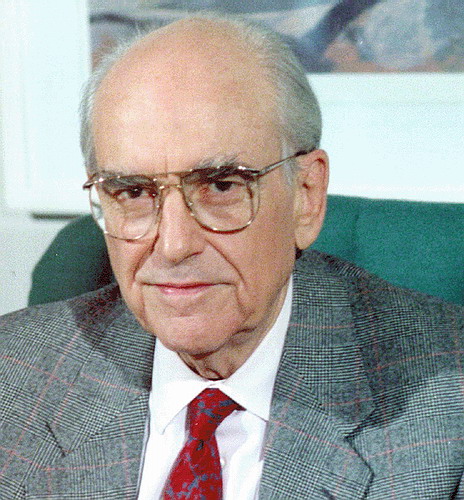

Andreas Papandreou was born in Chios on February 5th 1919. He attended the University of Athens Law School. Arrested in 1939 for his political activities during the Metaxa dictatorship he is later released from prison, going to the United States and continuing his education at Harvard University where he received a Doctorate in Economics. From 1942 to 1963 he lectured at Harvard as an associate professor, and was a full professor at the University of Minnesota, Northwestern University, University of California at Berkeley where he was the Dean of the School of Economics. He returned to Greece in 1959 where he headed an economic development research program and was appointed Chairman of the Board of Directors and General Director of the Athens Economic Research Center and Advisor to the Bank of Greece. In 1964 when he was elected deputy for Achaia of his father George Papandreou's Center Union Party. Accused by the right wing of being the head of a leftwing secret society in the military planning to overthrow the government he is arrested in April 1967 by the military junta and released eight months later to exile in Sweden and later in Canada where he wrote his book Democracy At Gunpoint about the Junta and the historical events that led to it. In 1968 he founded the Panhellenic Liberation Movement (PAK) to resist the dictatorship. After the fall of the Colonels he returns to Greece and founds the Pan-Hellenic Socialist Movement (PASOK) which in 1977 wins 25% of the popular vote thus becoming the official opposition party to Constantine Karamanlis' New Democracy Party. In 1981 Papandreou's PASOK party wins the elections and he becomes Prime Minister of Greece. A terrific speaker and motivator Papandreou's years as Prime Minister feature many positive steps for Greece and a few minor steps backwards. In 1989 he married Olympic Airways hostess Dimitra Liani, divorcing his American wife of 38 years, the highly respected Margaret Papandreou. Accused of involvement in a Bank of Crete scandal he loses the elections to New Democracy now headed by his old nemesis Constantine Mitsotakis, but before leaving office adjusts the election laws to limit the power of the incoming party. Following decension within ND and the bolting of several party members, PASOK wins the 1993 elections and again Papandreou is Prime Minister. His last term he is bothered by health and age and finally steps down as Prime Minister and leader of Pasok and is succeeded by Costas Simitis. Papandreou dies on 23rd of June 1996. Andreas Papandreou, whether loved or hated was one of the most important leaders in the history of Greece. Pehaps he will be best remembered for leaving his son George Papandreou, one of the most progressive leaders in the Greek government (or anywhere for that matter) and his son Nicholas an acclaimed writer.